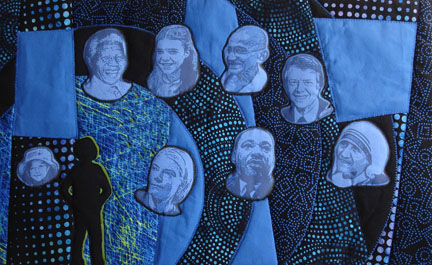 |
The Peacemakers
In the book I tell a little about each of these eight
peacemakers. Here is a bit more, some of my
favorite quotes from each of them, and links to
a few of the
sites where you can learn more.
|
 1869-1948 1869-1948
Mohandas Gandhi used passive resistance in his life-long struggle for human equality, dignity, freedom from exploitation, injustice, and violence, first in South Africa for the rights of immigrants, then for India’s independence from British colonial rule, and finally for religious tolerance between the Hindus and Muslims of India and Pakistan. Willing to go to jail for a just cause, Gandhi sometimes used fasting as a way to impress upon others the need for non-violence. Just twelve days after a fast to end bloodshed between the Hindus and Muslims, Gandhi, 79 years old, was killed by an assassin as he walked to his evening prayers. The Indian people gave him the name Mahatma, meaning Great Soul, and his legacy of non-violence, carried on by Martin Luther King Jr., Cesar Chavez, Nelson Mandela and others, lives on.
- Be the change you want to see in the world.
- A man is but the product of his thoughts what he thinks, he becomes.
- Always aim at complete harmony of thought and word and deed. Always aim at purifying your thoughts and everything will be well.
- An eye for an eye only ends up making the whole world blind.
- An ounce of practice is worth more than tons of preaching.
- Each one has to find his peace from within. And peace to be real must be unaffected by outside circumstances.
- Everyone who wills can hear the inner voice. It is within everyone.
|
 1897-1980 1897-1980
Dorothy Day was a Catholic who, troubled by the poverty and unfair labor practices in the 1930s, founded the Catholic Worker, a newspaper which called on its readers to not just complain about social injustices, but to make personal responses. Thirty-three homes for those in need were set up across the country. Day was a pacifist who strongly believed in the words of Christ, “Put away your swords for those who live by the sword shall die by the sword.” After Japan attacked the ships at Pearl Harbor, she said, "We love our country.... We have been the only country in the world where men and women of all nations have taken refuge from oppression." But instead of fighting she urged her readers to continue their acts of mercy, caring for the sick and wounded, and growing food for the hungry.
- We can throw our pebble in the pond and be confident that its ever widening circle will reach around the world.
- People say, “What is the sense of our small effort?” They cannot see that we must lay one brick at a time, take one step at a time.
- We have all known the long loneliness and we have learned that the only solution is love and that love comes with community.
- People say, “What is the sense of our small effort?” They cannot see that we must lay one brick at a time, take one step at a time. A pebble cast into a pond causes ripples that spread in all directions. Each one of our thoughts, words and deeds is like that. No one has a right to sit down and feel hopeless. There’s too much work to do.
|
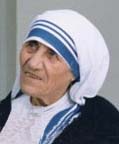 1910-1997 1910-1997
Mother Teresa was born in Albania. Her name was Agnes Gonxha Bojaxhiu. When she was twelve she felt a calling to serve God. At eighteen she became a nun, taking the name Sister Teresa. She went to India where she taught at St.. Mary’s High School in Calcutta until 1948 when the Catholic church granted Mother Teresa permission to leave the convent to work among the poor in the slums. She started an open air school for homeless children, attracting volunteers and funds to help her do her work. Two years later she founded the Missionaries of Charity, with the primary purpose of loving and caring for those who had no one else to care for them. An inspiration to millions, Mother Teresa died in 1997, leaving branches of the Missionaries of Charity in over 100 countries, continuing to care for the sick, neglected and poorest of the poor.
- We can do no great things, only small things with great love.
- In this life we cannot do great things. We can only do small things with great love.
- If you can't feed a hundred people, then feed just one.
- We shall never know all the good that a simple smile can do.
- Loneliness and the feeling of being unwanted is the most terrible poverty.
- The most terrible poverty is loneliness and the feeling of being unloved.
- Peace begins with a smile.
- Spread love everywhere you go. Let no one ever come to you without leaving happier.
- Kind words can be short and easy to speak, but their echoes are truly endless.
- Everytime you smile at someone, it is an action of love, a gift to that person, a beautiful thing.
- Good works are links that form a chain of love.
- Being unwanted, unloved, uncared for, forgotten by everybody, I think that is a much greater hunger, a much greater poverty than the person who has nothing to eat.
|
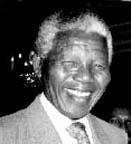 1918 1918
Nelson Mandela was a young lawyer in South Africa, when he joined the African National Convention and engaged in passive resistance to the National Party’s apartheid policies which systematically oppressed blacks. He was tried for treason and acquitted, but when the National Party banned the ANC Mandela advocated for the over-throw of the government and helped form the Umkhonto we Sizwe. He was arrested and sentenced to five years hard labor, and while in prison tried again and sentenced along with eight other leaders to life imprisonment. During his twenty-seven years in prison he refused to compromise his political position to gain his freedom, and became a strong symbol of the resistance movement against apartheid. After his release, he helped lead the transition from minority rule and apartheid to a multi-racial democracy and as the first elected black president of South Africa advocated peace and reconciliation, both nationally and internationally.
- If you want to make peace with your enemy, you have to work with your enemy. Then he becomes your partner.
- For to be free is not merely to cast off one's chains, but to live in a way that respects and enhances the freedom of others.
- Education is the most powerful weapon which you can use to change the world
|
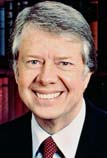 1924 1924
Jimmy Carter followed his humanitarian principles to influence positive changes as governor of Georgia and then President of the Untied States, including environmental protection legislation and the appointment of many women and minorities to judicial positions. Perhaps most significantly, he used his influence to instigate and mediate the Camp David Accords, a set of peace talks between two extremely hostile countries, Israel and Egypt, proving that negotiation can be effective in achieving peace even in difficult situations. After his term as President, Carter and his wife Roslyn founded the Carter Center. Guided by the central principle, "Everyone on earth should be able to live in peace," they work to resolve conflict, promote democracy, protect human rights, and prevent disease all over the world.
- Unless both sides win, no agreement can be permanent.
- We will not learn how to live together in peace by killing each other's children.
- We become not a melting pot but a beautiful mosaic. Different people, different beliefs, different yearnings, different hopes, different dreams.”
- Like music and art, love of nature is a common language that can transcend political or social boundaries.
|
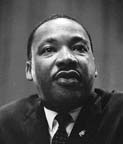 1929-1968 1929-1968
Martin Luther King, Jr. organized and led nonviolent demonstrations for civil rights. In 1955, after Rosa Parks refused to give up her bus seat for a white passenger in Montgomery, Alabama, Martin Luther King, Jr. helped lead a bus boycott which eventually resulted in a desegregation ruling by the U.S. Supreme Court. Joining with other southern black ministers, and modeling his non-violent methods on those of Gandhi, Dr. King helped organize other protests and demonstrations in an effort to gain voting rights for African-Americans. In 1964 250,000 protestors marched to Washington, DC, where King addressed them from the steps of the Lincoln Memorial with his famous “I Have a Dream” speech. During that year Congress passed, and the President signed, the Civil Rights Act of 1964. Four years later, continuing his work for fair treatment for his fellow citizens, Dr. King was assassinated while assisting with a garbage workers strike.
- Peace is not merely a distant goal that we seek, but a means by which we arrive at that goal.
- Darkness cannot drive out darkness; only light can do that. Hate cannot drive out hate; only love can do that.
- Almost always, the creative dedicated minority has made the world better.
- Nonviolence is the answer to the crucial political and moral questions of our time: the need for man to overcome oppression and violence without resorting to oppression and violence.
- Hate destroys a man's sense of values and his objectivity. It causes him to describe the beautiful as ugly and the ugly as beautiful, and to confuse the true with the false and the false with the true.
- We must combine the toughness of the serpent and the softness of the dove, a tough mind and a tender heart.
- Power at its best is love implementing the demands of justice. Justice at its best is love correcting everything that stands against love.
- At the center of non-violence stands the principle of love.
- I have a dream that my four little children will one day live in a nation where they will not be judged by the color of their skin, but by the content of their character.
- I have decided to stick with love. Hate is too great a burden to bear.
- The great initiative in this war is ours. The initiative to stop it must be ours.
|
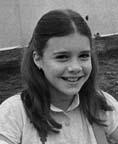 1972-1985 1972-1985
Samantha Smith was a ten year old girl who was afraid that the United States and the Soviet Union might have a nuclear war. She wrote to Yuri Andropov, President of the Soviet Union, asking him why his country wanted to "conquer the world or at least our country." He replied saying that his country very much wanted to live in peace and invited her to visit the Soviet Union where she found that Soviet children were much like American children and also interested in peace. After hearing both sides promise that they would not start a war Samantha asked, “they why do you both go on making missiles and aiming them at each other?” Samantha wrote a book, gave speeches, television appearances, and went to the Children's International Symposium in Japan sharing her experience and hopes for peace. Sadly she died in a plane crash when she was only thirteen years old.
- God made the world for us to live together in peace and not fight.
- “I dedicate this book to the children of the world. They know that peace is always possible.”
Photo Credits
Gandhi: Press Information Bureau of India
Dorothy Day: Marquette University
Mother Teresa: White House Public Domain Photo
Nelson Mandela:US Congress Public Domain Photo
Jimmy Carter: White House Public Domain Photo
Martin Luther King, Jr.: Library of Congress, Public Domain
Samantha Smith: TASS News Agency
Mattie Stepanek: By permission of Jeni Stepanek
|
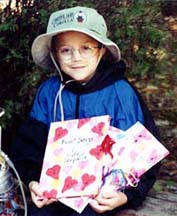 1990-2004 1990-2004
Mattie Stepanek was born with a rare form of muscular dystrophy and though knew he would not live long, chose to celebrate life and perceive it as a blessing. When he was three years old, after his brother, just a year older than Mattie died of the same disease, Mattie began writing poems that he called “Heartsongs”. In 2001 Mattie went through a difficult time and death seemed near. He was asked to make a wish. Mattie had three.
“I wish to have at least one of my collections of Heartsongs poetry published as my gift to the world. I wish to have Oprah Winfrey share the message of hope and peace in my Heartsongs on her show because people turn to her for inspiration and direction. And, I wish to have fifteen minutes to talk peace with Jimmy Carter so that I can make sure I am doing all that I can and should be doing to become a peacemaker for others.”
Not only did Mattie’s wishes come true, but he rallied to live three more years, writing and publishing seven Heartsongs books--all NY Times bestsellers--appearing on a number of television shows where millions of people were inspired by his message, and developing a friendship with his hero, Jimmy Carter, that led to their collaboration on a collection of essays about peace, Just Peace. Mattie’s message of hope and peace continues to spread through his books, the Internet, and various organizations that keep his spirit alive. Mattie wanted to be remembered as “a poet, a peacemaker, and a philosopher who played.”
- We have to make peace an attitude. Then we have to make it a habit. Finally, we must decide to live peace, to share it around the world—not just talk about it.
- We must remember to play after every storm and to celebrate the gift of life as we have it, or else life becomes a task, rather than a gift. We must always listen to the song in our heart, and share that song with others
|
Which peacemakers
would you choose?
Biographies of Peacemakers
My Hero: Peacemaker Heroes
Blessed are the Peacemakers. How many do you know?
Peace Heroes
What is a Peace Hero?
Why a page on Peace Heroes?
Winners of the Nobel Peace Prize
Facts about the Nobel Peace Prize
|
More Young Peacemakers
These three young people were given
World Of Children Awards
to help them
continue their good works.
Ashlee's Toy Closet
Ten-year-old Ashlee has donated over 100,000 toys to children after disasters. She lost everything herself at the age of six when her family home was destroyed by fire, and two years later, when over 200 homes were destroyed in a Forest fire near Lake Tahoe, she began collecting toys for those children.
Random Kid: The Power of ANYone
At 10 years old Talia Lehman helped organize fundraising relief efforts by children nationwide to raise more than $10 million for the victims of Hurricane Katrina. She went on to found RandomKid, a non-profit that has raised funds to help children in 48 states and nineteen countries, and helps other kids use their power to solve real world problems.
Children Helping Children
Jourdan Urbach, already an accomplished violinist at the age of 7, found that his music could stimulate the brain and help healing in children with neurological problems. He began gathering other musicians and performing “Concerts for a Cure”, providing music therapy and raising millions of dollars to fund programs. |
The Peacemaker
A Legend of the Haudensaunee
Read this legend about the origin of the Iroquis League.
How did the Native Americans influence our ideals of
equality, liberty, and democracy?
How aware were the Founding Fathers of the Great Law of the Iroquis League as they framed our Constitution?
PDF of Peacemaker article |
Organizations and activities
to help you be a peacemaker.
Parents and teachers can help, too!
|
|
|
|
 1869-1948
1869-1948 1897-1980
1897-1980 1910-1997
1910-1997 1918
1918 1924
1924 1929-1968
1929-1968 1972-1985
1972-1985 1990-2004
1990-2004